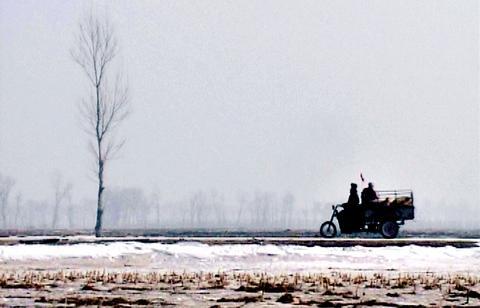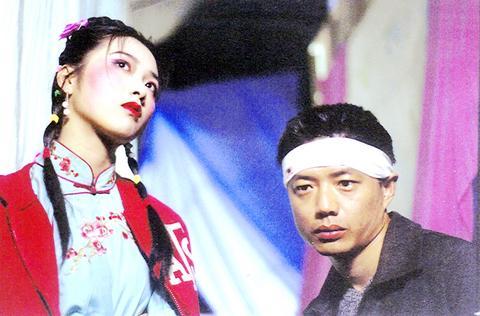November is autumn and the start of Taiwan's movie season. Raising the curtain for a string of movie events is The South Taiwan Film and Video Festival (
Later this month, Nov. 24, there is the annual Taipei Golden Horse Film Festival (台北金馬影展), the biggest film festival of Taiwan. In December it is the Golden Horse Awards (金馬獎).

PHOTOS COURTESY OF TAINAN ARTS UNIVERSITY
The South Taiwan Film and Video Festival starts next Tuesday in Kaohsiung and is a festival aiming to balance the fact that most art-house films are from Taipei.

Fifty feature-length films will be touring three south Taiwan cities -- Kaohsiung, Tainan and Chiayi. It can be seen as the largest film event in Southern Taiwan.
The main feature this year at the festival is its collection of Chinese independent movies made by young filmmakers, directors even younger than the so-called Gen Z filmmakers.

Incense (
The South Taiwan Film Festival will screen documentaries that have recently made headlines. Canadian director Atom Egoyan's Arayat, a drama looking at the historical truth of the Armenian genocide, and Blackboard, a humorous story about the deficit of education in Iran's mountain area, will both come back to the silver screen for southern Taiwanese movie fans.
Meanwhile, in Taipei, next Tuesday is also the opening day for a film festival -- the My Camera Film Festival (當我喊出開麥拉), celebrating the two-year anniversary of SPOT -- Taipei Film House.
The first feature of the festival is a mini retro screening of director Cheng Wen-tang's (鄭文堂) films. Cheng is a filmmaker who gained fame along with the growth of SPOT in the past two years.
His Venice film festival award-winning dramaSomewhere Over the Dreamland (夢幻部落) was premiered at SPOT two years ago. The mini retro will showcase Cheng's previous works, when he was a documentary maker in the 1980s and 1990s focusing on political issues and environmental protection.
The Days Without the Government (沒有政府的日子, 1987) tells about a 200-day long protest by employees of a chemical factory banding together because of the dumping of chemical waste into the nearby river. The Contract with Tso-shui River (濁水溪的契約, 1999) is a documentary dwelling on the past glory days of Taiwan longest river.
Another theme of the festival is to show the winning films of past winners at Taipei film festivals. Taipei Film Festival serves to discover talents among Taiwanese filmmakers.
The Taipei Film Awards have in the past two years become a dream award of young filmmakers seeking recognition apart from the more mainstream Golden Horse Awards.
But after winning the awards, most filmmakers find it difficult to screen their films because Taiwan is short of art-house movie theaters.
SPOT, as Taiwan's first arts movie theater, offers the opportunity for moviegoers to appreciate the independent spirit of the winning films.
Tickets for both the South Taiwan Film Festival and the My Camera Film Festival are available from the Web site: www.artsticket.com.tw.

In the March 9 edition of the Taipei Times a piece by Ninon Godefroy ran with the headine “The quiet, gentle rhythm of Taiwan.” It started with the line “Taiwan is a small, humble place. There is no Eiffel Tower, no pyramids — no singular attraction that draws the world’s attention.” I laughed out loud at that. This was out of no disrespect for the author or the piece, which made some interesting analogies and good points about how both Din Tai Fung’s and Taiwan Semiconductor Manufacturing Co’s (TSMC, 台積電) meticulous attention to detail and quality are not quite up to

April 28 to May 4 During the Japanese colonial era, a city’s “first” high school typically served Japanese students, while Taiwanese attended the “second” high school. Only in Taichung was this reversed. That’s because when Taichung First High School opened its doors on May 1, 1915 to serve Taiwanese students who were previously barred from secondary education, it was the only high school in town. Former principal Hideo Azukisawa threatened to quit when the government in 1922 attempted to transfer the “first” designation to a new local high school for Japanese students, leading to this unusual situation. Prior to the Taichung First

Chinese Nationalist Party (KMT) Chairman Eric Chu (朱立倫) hatched a bold plan to charge forward and seize the initiative when he held a protest in front of the Taipei City Prosecutors’ Office. Though risky, because illegal, its success would help tackle at least six problems facing both himself and the KMT. What he did not see coming was Taipei Mayor Chiang Wan-an (將萬安) tripping him up out of the gate. In spite of Chu being the most consequential and successful KMT chairman since the early 2010s — arguably saving the party from financial ruin and restoring its electoral viability —

The Ministry of Education last month proposed a nationwide ban on mobile devices in schools, aiming to curb concerns over student phone addiction. Under the revised regulation, which will take effect in August, teachers and schools will be required to collect mobile devices — including phones, laptops and wearables devices — for safekeeping during school hours, unless they are being used for educational purposes. For Chang Fong-ching (張鳳琴), the ban will have a positive impact. “It’s a good move,” says the professor in the department of